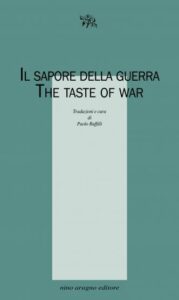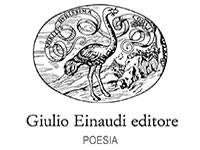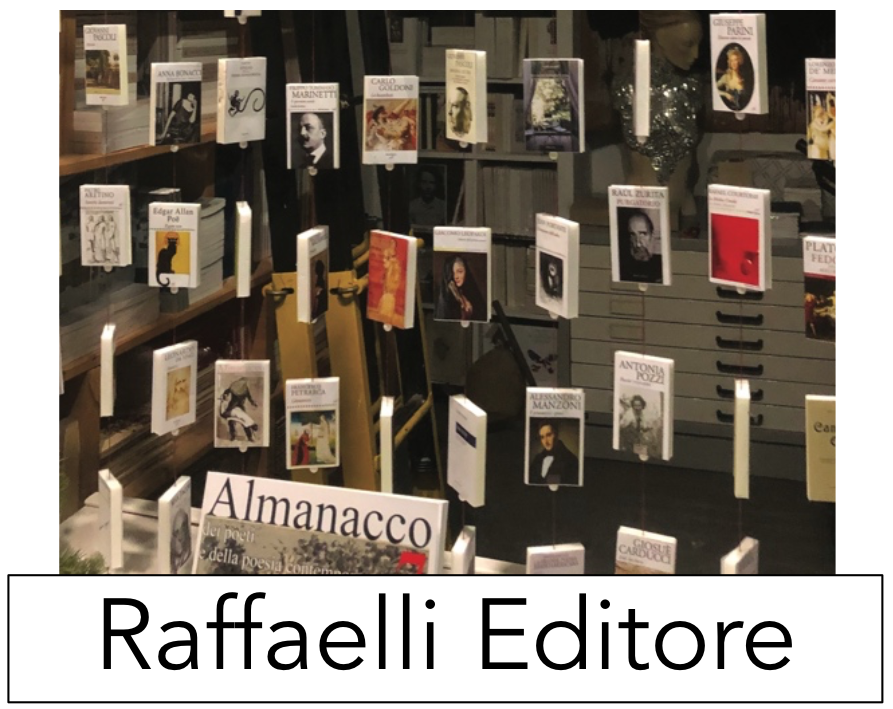GUERRA-WAR: antologia italiano-inglese Traduzioni e cura di Paolo Ruffilli
IL SAPORE DELLA GUERRA (Nino Aragno Editore)
30 poeti di diversi paesi del mondo ci ricordano quanto sia aspro ed urticante il sapore della guerra, grondante sangue e sofferenza al di là di qualsiasi retorica. Tutte le guerre, passate e presenti.
THE TASTE OF WAR
30 poets from different countries of the world remind us how bitter and stinging the taste of war is, dripping with blood and suffering beyond any rhetoric. All wars, past and present.
GLI AUTORI
Eldar Akhadov, Ataol Behramoglu, Pat Boran, Maurizio Cucchi, John Deane, Mimmi Diệu Hương Bergström, Kjell Espmark, Ruth Fainlight, Mordechai Geldman, Joumana Haddad, Sungrye Han, Toshiko Hirata, Alexander Karpenko, Christos Koukis, Raquel Lanseros, Sylvie Marie, Luis Garcia Montero, Brane Mozetič, Cees Nooteboom, Fernando Rendon, Paolo Ruffilli, Mamta Sagar, Hadaa Sendoo, Andrey Valerievich Serdyuk, Krzysztof Szatrawski, Tuğrul Tanyol, Willem van Toorn, Jean-Charles Vegliante, Adam Zagajewski
Il progetto “Il sapore della guerra” nasce più di due anni fa, dalla convinzione che l’unica opzione per il futuro degli uomini sia la pace. Utopia, certo, vista la realtà opposta delle molte guerre del passato remoto e recente in zone vicine e lontane. Ma la poesia deve la sua potenza al suo essere controcorrente. In questo senso ho ricevuto molti stimoli e risposte leggendo i poeti e, in particolare, sono stato istigato da una breve poesia di Kjell Espmark nella quale l’autore dice metaforicamente di girare con un coltello in tasca per tagliare la lingua a chi parla della “bella morte” in guerra.
Per liberarsi una volta per tutte dalla mitologia della bella morte e dalla sua vuota retorica, il progetto è andato avanti. Ho interpellato, tutti vivi al momento del confronto, più del doppio dei poeti ora qui antologizzati. La mia intenzione non era quella di spingerli a scrivere qualcosa sull’argomento, per una istintiva e magari sbagliata sfiducia nella poesia d’occasione. L’intenzione era invece quella di sondare la loro opera, alla ricerca di versi che parlassero direttamente o indirettamente della guerra nel più profondo coinvolgimento. Cercavo poesie che abbaiassero e mordessero come cani non solo arrabbiati ma anche in apparente fulminante tranquillità. Da qui le mie scelte.
The “The taste of war” project was born more than two years ago, from the belief that the only option for the future of men is peace. Utopia, of course, given the opposite reality of the many wars of the distant and recent past in near and far areas. But poetry owes its power to its being against the tide. In this sense I received many stimuli and responses by reading poets and, in particular, I was instigated by a short poem by Kjell Espmarc in which the author metaphorically says to go around with a knife in his pocket to cut out the tongue of anyone who speaks of the “beautiful death ” in war.
In order to free itself once and for all from the mythology of the beautiful death and its empty rhetoric, the project went ahead. I have consulted, all alive at the time of the confrontation, more than double the poets now anthologized here. My intention was not to push them to write something on the subject, out of an instinctive and perhaps mistaken distrust of occasional poetry. Instead, the intention was to probe their work, looking for verses that spoke directly or indirectly about the war in its deepest involvement. I was looking for poems that barked and bit like dogs not only angry but also in apparent fulminant tranquillity. Hence my choices.
Paolo Ruffilli





